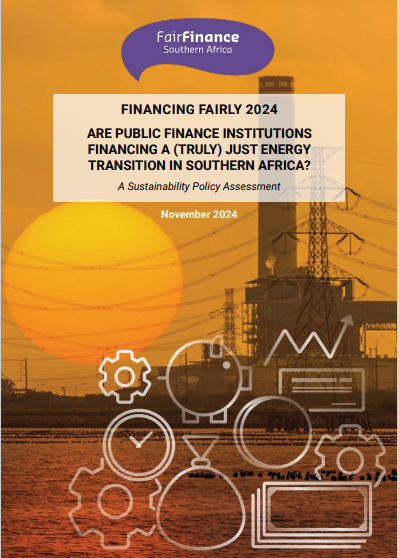Fair Finance Coalition Southern Africa launches third policy assessment

On 27th November Fair Finance Coalition Southern Africa launched the findings of its third policy assessment on eight Public Finance Institutions across the nine different themes.
In this third iteration of the series, Financing Fairly 2024, FFCSA analyses whether the policies of these PFIs are indicative of an energy transition that is (truly) just for Southern Africa. The report presents the findings of research conducted on the publicly available policies of eight PFIs (1) operating in Southern Africa.
The eight institutions comprise a mix of national, regional and multilateral development banks, all of which provide financial support for the energy sector in the region.
The research used the Fair Finance Guide Methodology to assess and benchmark the publicly available policies of the eight institutions against international sustainability standards across nine different themes (2).
The findings of this latest policy assessment reveal that PFIs operating in Southern Africa are far from demonstrating the policy
commitments necessary to enable a Just Energy Transition in the region.
Overall, the policies of the eight PFIs scored poorly against the Methodology, indicating that there is much room for improvement when it comes to aligning their policies with international sustainability standards.

The low scores on key themes such as Oil & Gas, Climate Change and Power Generation demonstrate that the policies of the eight PFIs are inadequate to address a Just Energy Transition in Southern Africa.
1. The eight Public Finance Institutions assessed are: African Development Bank (AfDB), African Export-Import Bank
(Afreximbank), Development Bank of Southern Africa (DBSA), Export Credit Insurance Corporation (ECIC), Industrial
Development Corporation (IDC), New Development Bank (NDB) Public Investment Corporation (PIC), and the World Bank (WB)
2.The nine different themes are: Climate Change, Corruption, Gender Equality, Human Rights, Labour Rights, Nature, Oil & Gas,
Power Generation, and Transparency & Accountability.
